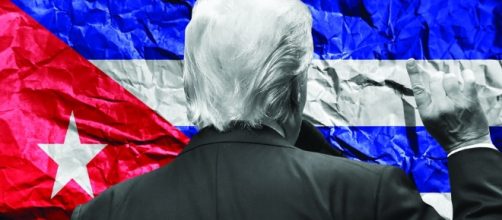One of the many pieces of unfinished business that President Trump has to deal with left over from the Obama administration is what to do about Cuba. Many of President Obama’s initiatives to open relations with the communist dictatorship 90 miles from the United States proved to be controversial, not so much because they were considered bad policy but because the United States did not get any concessions in return, especially on human rights. The Daily Caller is reporting that Trump is getting ready to reverse some of the Obama Cuba policies.
Obama opens relations with Cuba
President Obama reestablished diplomatic ties with Cuba, ending restrictions on travel to the island nation, and urging the Congress to end the economic embargo against the Havana regime. He also ended the so-called “wet foot dry foot” immigration policy that automatically granted Cubans refugee status if they managed to get to dry land before being apprehended by the Coast Guard.
The Cuban initiatives prove to be controversial
Many Cuban-Americans, including Sen. Marco Rubio, R-Florida and Sen Sen. Bob Menendez, D-New Jersey, were aghast at the Obama effort. While some hardliners might favor opening relations with Cuba, they noted that President Obama did not try to get concessions from the Cuban government, particularly when human rights are concerned.
Indeed, in the wake of the opening of Cuba, the communist government has initiated a crackdown, arresting dissidents and suppressing dissent.
What Donald Trump has in mind
Trump has always been of two minds when it comes to relations with Cuba. The businessman in him would love to see the economic embargo lifted. The idea of a Trump resort along one of Cuba’s beaches certainly is appealing. On the other hand, Trump the politician and president knows perfectly well the wages of appeasement. Cuba policy is under review, though the rumor is that Trump will make a speech in Miami detailing some reversals of the Obama initiative. Top on the list will be restrictions on travel and investment, particularly with entities controlled by Cuba’s Revolutionary Armed Forces.
Such a move would put a crimp on travel and investment in the island dictatorship. Many allegedly private enterprises in Cuba are owned by the Cuban military.
Cuban refugees a problem
On the other hand, reinstating the wet foot dry foot policy regarding Cuban refugees could be a political issue. Traditionally the United States has been generous to people fleeing Cuba, making the assumption that they are leaving oppression and persecution. Before the wet foot dry foot policy, enacted by President Bill Clinton in 1995, any Cuban fleeing the island tyranny was considered a refugee, whether found at sea or dry land. If Trump decides to rescind the policy of treating all Cuban refugees as illegal aliens, immigration advocates will accuse him of favoring Cubans over other refugees for arbitrary reasons.


